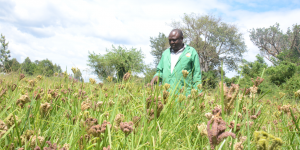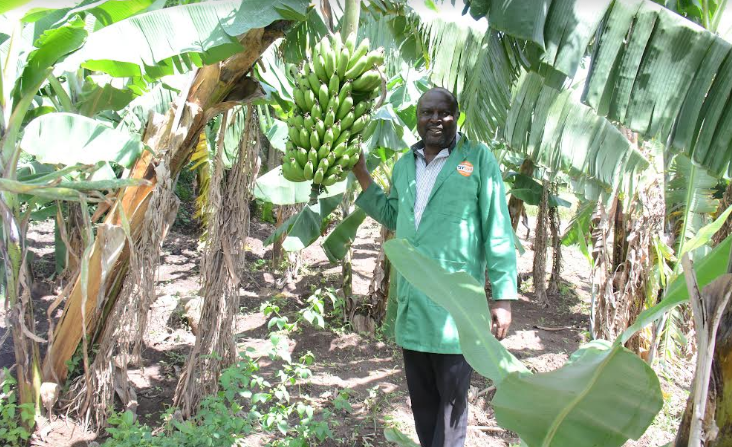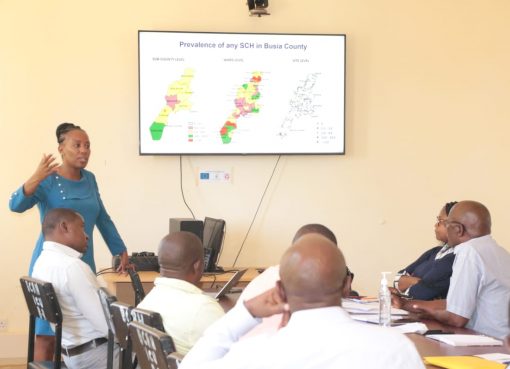Over a decade ago, 66-year-old economist John Magaiwa made a life-changing decision when he quit his 40-year stay in the city and retired to the village in Migori County to begin his sunset life.
Making changes in a lifestyle one has been used to for three-quarters of their entire lifetime often triggers surprises to one’s age mates.
However, feeling he had had enough of the lights, hooting and inhaled enough factory and automobile emissions, Magaiwa decided it was time to go home.
A holder of a master’s degree in Economics and with a vast experience in the field to boot, the tall and burly man from the Kuria community thought agriculture was also a field worth trying during the remainder of his life.

Magaiwa who hails from Kiamakebe village, Tagare ward in Kuria West, a region deemed climatically favourable for farming activities in Migori County, then decided to venture into serious crop growing to keep him occupied after quitting city life.
Currently pursuing doctorate studies, Magaiwa who gave KNA his full life history this week says he does not want any form of employment whatsoever due to his old age.
“I lived my entire adult life moving from one town to another while changing companies working as an accountant. However, it reached a time when I felt I have accomplished all I wanted in the city, and that home was now the best place to settle,” said Magaiwa.
Although he states that his decision was in contrast to any skill he had especially in farming, the father of nine and grand-father admits that he took a risk plunging into agriculture without any skilled knowhow.
“When the thought of farming struck my mind, I had no skill in the agricultural field, except the basic childhood knowledge,” he recounts.
Owning a vast land posed a challenge to him as he could not tell which crop performs well on which side of his land. At the same time, the cost of farming was rising steadily, something he said almost made him think about leasing the whole land to other interested parties.
Within his 20 hectares piece of land, he decided to do mixed-crop farming. This, however, he did without any scientific intervention.
He states that land purchase was his biggest investment after educating his children from his three wives.
“During my working days, I spent a large part of my money educating my children, but besides that, I bought land as a hobby,” he said.
Through trial and error, he started growing banana plants. From his savings, he hired youths to dig 3,000 banana holes.
While expectations would see him rush to the agriculture department to get certified seed, Magaiwa instead opted to borrow seeds from local farmers.
He moved from one village to another, collecting different seed varieties. This was to test the best-performing variety for his farm.
“This variety you are seeing here, I got it after several trials. I got my seeds randomly from local farmers. The same goes for other crops in the entire farm,” he explained to the KNA crew while showing us the different crops he grows.
Magaiwa said that certified seeds are mostly genetically modified (GMOs), which compels a farmer to use inorganic fertilizers.
This was costly for him as he had large farmlands to utilise. Instead, he opted for organic manures, which he also purchased locally at fair prices.
“One bag of fertilizer costs between Sh6, 000 to Sh7, 000. Yet on this farm, I will need hundreds of bags,” he explained.
“I opted for organic manure, which I purchased at Sh2, 000 per lorry. It is much cheaper and lasts longer in the soil. It also conserves my soil fertility,” he added.
Apart from the banana plantation, the farmer also boasts of a wide variety of locally grown crops.
His farm is divided into several sections cultivated with different crops. On the same farm, Magaiwa has a five-hectare maize plantation, a hectare of sweet potato vines, cassava, yams, beans and different varieties of vegetables.
On the other side, he has ten fishponds, a sunflower garden, a hectare of sorghum crop and over 3000 pineapple plants.
While still walking on the farm, the sweet scent of honey filled the air. There is a section set aside for beekeeping where he has set up 100 beehives.
When asked why he could not stick to one type of crop, his response was amazing. Magaiwa states that he wanted to utilize his vast land fully for agricultural purposes. In addition, modern farming restricts farmers to one crop that over time exhausts soil fertility. He wished not to waste his land.
Magaiwa outlined that different crops presented him with different life experiences. This fulfils his desire for a different life from the one he has lived, hence he enjoys the dynamics.
“I have lived behind the desk handling the same task for decades. This farm allows me to have different approaches,” states the economist.
For the last two years, Magaiwa has been the main contributor to food consumed by his villagers and the far-flung markets within and beyond Migori County.
Many residents visit his farm to get vegetables for domestic consumption. On the other hand, on a weekly basis, traders from the nearby Mabera market flock the farm to purchase bananas. He admits that the lack of food in the community and surrounding regions leaves him no choice but to sell at an affordable price.
“On a weekly basis, I sell bananas to traders from around,” said Magaiwa. However, his main source of the market for his farm produce comes from his fellow villagers who buy in less bulk. He anticipates larger markets in the future when he fully goes commercial. The banana plantation receives customers daily from the nearby Mabera market.
Currently, a bunch of bananas from his farm ranges between Sh300 and Sh1000. To give back to the community, the farm has offered employment opportunities to eight members of the community on a long-term basis.
In addition, on a daily basis, he hires fellow villagers to help in farm operations, especially the ones who come knocking. Majority of his workers are youths whom he inspires to work hard and embrace agriculture since formal jobs are hard to come by.
Magaiwa views city life as slavery and captivity where one is programmed to do similar things year in and year out. This is in contrast to the life he is currently leading.
In future, he aims to fully venture into commercial production of honey, sunflower oil and pineapples.
By Polycarp Ochieng’ and George Agimba




